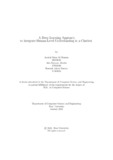A deep learning approach to integrate human-level understanding in a Chatbot
Date
2021-01Metadata
Show full item recordAbstract
AI-powered computers like chatbots have taken over the market today to reduce
human workload. Unlike humans, chatbots reply immediately, are available 24/7
and can assist several people at the same time. Due to the outbreak of Covid-19[3]
as everything has just shifted to online, the demand of bots has increased tremendously. Considering the various applications, it is estimated that the chatbot market
will reach $1.25 billion by 2025[2]. Though chatbots perform well in task-oriented
activities, in most cases they fail to understand personalised opinions, statements or
even queries. Generally, people prefer human agents as it is easier to share personal
views and feedbacks with them. Also, poor understanding capabilities of a machine
disinterest humans to continue conversations with them. Usually, chatbots give absurd responses when they are unable to interpret a user’s text accurately. Hence,
it is very essential to develop chatbots with human-level understanding. Most bots
are incorporated with sentiments to analyse reviews of products and services of an
organisation. However, this is not enough as only positive and negative judgements
cannot help an organization improve their lackings. To make chatbots function
more precisely, it needs to identify the granular reaction of a customer as well as the
reason behind it. Thus, in our research we incorporated all these key features that
are necessary for a chatbot to have a human-like understanding of a text. We performed sentiment analysis, emotion detection, intent classification and name-entity
recognition using deep learning to modify chatbots with humanistic understanding
and intelligence. Conventionally, machine learning is used to perform analysis of the
components mentioned above, however, it is seen that ML models ,often ,are unable
to understand the inferences and complex sentences of human utterance and this
is where deep learning has the upperhand [1]. Therefore, we chose deep learning
models such as LSTM, Bi-directional LSTM, GRU, Bi-directional GRU etc to train
our chatbot so that it can make more accurate predictions. From our training, we
got the best performance model LSTM with accuracy 89% in sentiment analysis and
Bi-directional GRU with accuracy 91%, 80.7%, 98.9% for emotion detection, intent
classification and named-entity recognition respectively.

